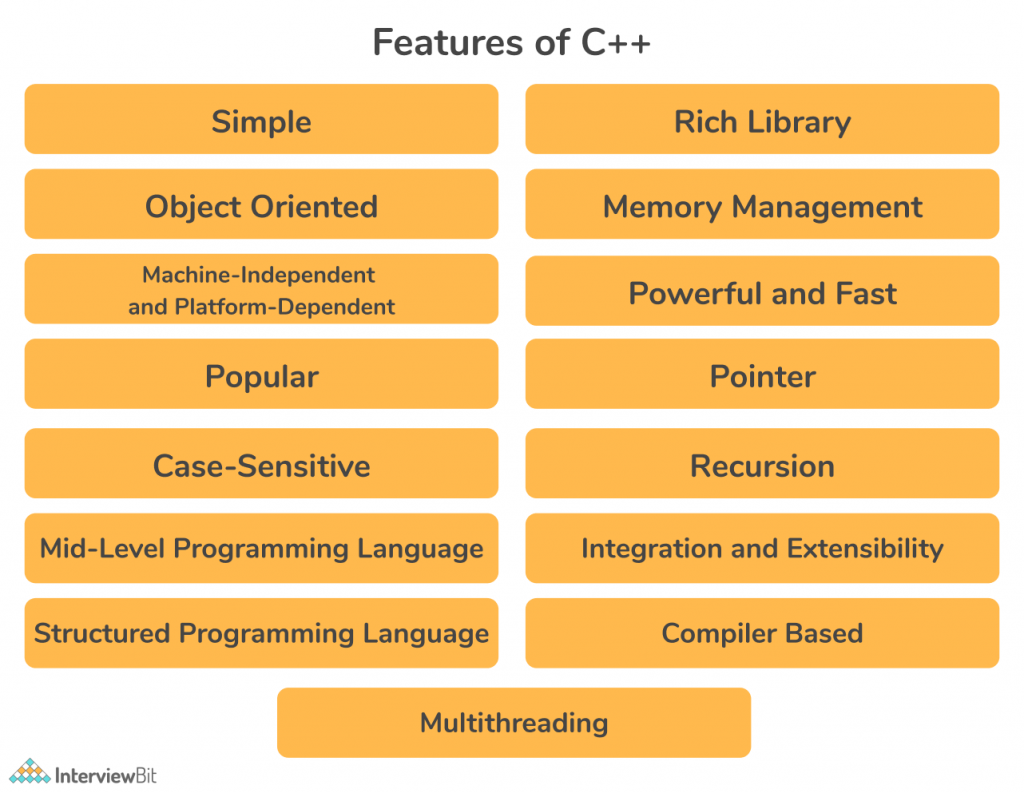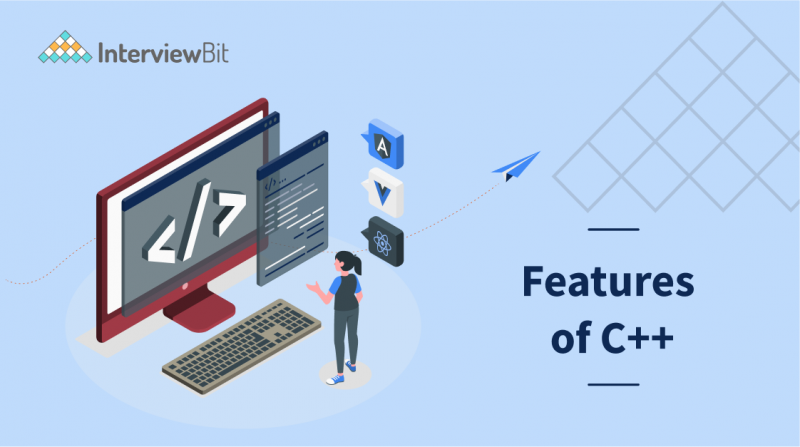- Why C++?
- Top C++ Features
- 1. Simple
- 2. Object Oriented
- 3. Machine Independent and Platform-Dependent
- 4. Popular
- 5. Case-Sensitive
- 6. Mid-level programming language
- 7. Structured Programming Language
- 8. Rich Library
- 9. Memory Management
- 10. Powerful and Fast
- 11. Pointer
- 12. Recursion
- 13. Integration and Extensibility
- 14. Compiler based
- 15. Multi-threading
- Conclusion
- FAQs
- Additional Resources
Bjarne Stroustrup’s invention of C++ in 1979, as an extension to C, marked a new frontier for computer programming. Although he originally called it “C with Classes”, the name was changed to C++ in 1983. It was designed to make programming easier and more enjoyable for the individual programmer. Over the years, C++ has developed into a powerful and versatile programming language.
C++ is a general-purpose programming language that includes features of numerous computer programming models like object-oriented, imperative (programming paradigm that specifies the steps/commands that the computer must take to accomplish the goal) and generic programming, and many more. As an enhancement of the C language, C++ includes an object-oriented paradigm. C++ is a middle-level programming language (include features of both low-level and high-level programming languages) offering that can be used to program both low-level (drivers, kernels) as well as higher-level applications (games, GUI, desktop applications, etc.). Furthermore, C++ offers some additional features over C, such as classes, default function arguments, inheritance, exception handling, etc. It can run on different operating systems, including Windows, Linux, and Mac.
Why C++?
As an object-oriented programming (OOP) language (similar to Java), C++ provides programmers with all the tools they need to build programs that follow OOP concepts.
Confused about your next job?
- Due to its outstanding reliability, performance, and versatility, C++ remains in high demand at present.
- The compiling and execution of C++ are substantially faster than those of other general-purpose programming languages, which makes it ideal for low-latency applications.
- Since C++ is versatile and quick, it can offer a market-competitive wage. Being a good C++ programmer means you will never be out of work and, more importantly, you will be highly paid for your work.
- It is the most widely used programming language for application and system programming, so you can pick your area of interest in software development.
- C++ is fast, offers users a great deal of memory control, and has a wide range of libraries capable of creating complex graphics.
Top C++ Features

1. Simple
We expect to understand a new programming language thoroughly when we start using it. However, C++ is one of the most simple programming languages. As long as you are familiar with the C language, moving to C++ will be very easy. Unlike other programming languages, C++ provides a structured approach (a programming paradigm that facilitates the creation of programs with readable code and reusable components.) and allows you to design a modular solution by dividing the problem into parts. In addition, you have access to a variety of library functions and data types that can be used when implementing the solution. For any type of project development, C++ uses the bottom-up approach, which helps break large tasks down into small pieces.
2. Object Oriented
C++ is an Object-Oriented Programming Language (OOP). OOPs, are the most important feature of C++ since they enable easier development and maintenance. Objects (instances of a class) can be created and destroyed while programming. C++ follows the following concept of OOPs to make the development and maintenance of the software system easier:
- Polymorphism: Poly means “many” and morphism means “form”. Thus, polymorphism enhances flexible programming by allowing data to be displayed in more than one form.
- Inheritance: Inheritance is the process of allowing a class to inherit the features or properties (fields and methods) of another class. As a result, the program is less redundant, and it is easy to move properties from one class to another.
- Data Encapsulation: Essentially, encapsulation means packaging together relevant data and its associated methods and functions into a single unit/block.
- Data Abstraction: It refers to the process of displaying only the key details/information of data to users without including the underlying/background details or the method used to gather it. Units that are trivial or not essential are not displayed.
- Data Hiding: It is the process of protecting data from unauthorized access. Essentially, it secures the data.
3. Machine Independent and Platform-Dependent
C++ is machine-independent, which means programs can be executed on many machines with little or no changes. C++, however, is not platform-independent, so programs can only be executed on the platform on which they were developed & compiled. The compiler produces a .exe file that is OS-dependent and cannot be run on different operating systems. Suppose you wrote a program or piece of code that runs on Linux, Windows, and Mac OSX, making it Machine Independent, but the executable file of the C++ program cannot run on different Operating systems/platforms.
4. Popular
With its support for object-oriented programming, C++ can be a good basis for a number of other programming languages. C++ is a favourite today for game development and complex business applications because of its incredibly fast speed and precise memory management. The language is applied to a variety of different fields requiring high-performance applications. Adobe products, Unreal Engine, and popular browsers such as Chrome and Firefox are all built using C++.
5. Case-Sensitive
C++ is case-sensitive, which means that it treats uppercase and lowercase characters differently. For instance, when we write cout (used to display the output) as ‘Cout’ or “COUT”, the meaning of the term changes. Some programming languages, such as HTML and MySQL, do not care about cases.
6. Mid-level programming language
Having the features of both a low-level (machine-level) language and a high-level language (user-oriented language that is easily understandable and close to human language), C++ is termed a mil-level or intermediate programming language. C++ is used to develop low-level system applications, such as kernels, drivers, etc., and high-level applications, such as GUIs, desktop applications, etc.
7. Structured Programming Language
C++ is a structured programming language. Programming in C++ is modular i.e. we are able to break the complex code into smaller pieces (subdividing a computer program into separate sub-programs) and combine them using functions, classes, and objects. This results in cleaner code and makes maintenance much easier.
8. Rich Library
C++ provides developers with many built-in functions or libraries that save developers time and make development faster. Some of the header files include:
- <iostream>: Include C++ standard input and output functions
- <cmath>: Include math library functions
- <cstdlib>: Includes functions that convert numbers to text and vice versa, allocate memory, create random numbers, and perform various other functions.
- <fstream>: Include functions to create files, write information to files, and read information from files.
- <iterator>: Include classes for accessing data in the C++ Standard Library containers
- <algorithm>: Include functions for manipulating data in C++ Standard Library containers
9. Memory Management
The C++ language allows dynamic memory allocation, which means that we can allocate memory for a variable, object, or array at run time. In C++, memory is divided into stack and heap storage. Stacks refer to the memory allocated for variables inside functions. The heap, on the other hand, refers to unused memory that can be dynamically allocated. If you don’t know the amount of memory required to store information in a defined variable, the size can be determined manually during runtime. New and delete operators are used to allocating and deallocating memory, respectively.
10. Powerful and Fast
C++ execution time and compiling time are faster than any other programming language. In addition, it supports a wide range of data types, functions, and operators. As a result, operating systems, browsers, games, and so forth, can be developed. C++ is an advanced language that supports a wide range of programming techniques, like procedural, object-oriented, functional, etc. Due to this, C++ is very powerful and flexible.
11. Pointer
A pointer is a variable in C++ that stores the address of another variable. They point to a variable’s location in memory. Pointers are supported by C++ and can solve a large number of problems requiring memory access. A pointer can be used for memory, structures, functions, arrays, etc. Pointers are declared as:
int *pointVar;
Or
int* pointVar;
In the above example, var is a variable holding the value ‘5’ and 0x61ff08 is the address of the var (). pointVar is the pointer whose value 0x61ff08 points to the address of the variable var.
12. Recursion
When a function calls itself, it is called a recursive function, and this technique is known as recursion. In this way, the function can be repeated multiple times since it calls itself during its execution. We can call the functions, which conserve memory by not having to repeatedly write the same code. It reduces the length of our code and makes it cleaner.
13. Integration and Extensibility
Object-oriented support enables C++ programs to be maintainable and extensible. This means that large-scale applications can be created. C++ has the potential to integrate and apply newer features easily. It has been used effectively for many diverse applications, including mobile app and game development, software development (e.g., Image Ready, Adobe Premiere, etc), and web browser development (e.g., Google Chrome, Mozilla Firefox, etc.), as well as bank applications (e.g., Infosys Finacle, etc.).
14. Compiler based
It is not possible to run C++ code without compilation, since it is a compiler-based programming language. To execute our program, we must first compile it using a compiler that translates the program into machine language which can be understood directly by the system. The resulting program is therefore highly efficient and faster than most interpreter-based languages, such as Python and Java.
15. Multi-threading
As a specialized form of multitasking, multithreading allows your system to run several parts/threads of programs simultaneously. The multithreaded program consists of two or more threads (define a separate path of execution) that run simultaneously. Since C++ does not have built-in support for multithreaded applications, it relies entirely on external libraries to provide this functionality.
Conclusion
As an extension of the C language, C++ enables the use of object-oriented paradigms. It is the oldest and yet most efficient programming language that continues to dominate the programming field. Due to its imperative, object-oriented, and generic features, it is widely used nowadays for competitive programming. Nowadays, C++ code plays quite an integral role in many contemporary systems such as operating systems, web browsers, databases, etc. Additionally, the speed of C++ makes it a good choice for performance-critical applications.
In this article, we have highlighted the remarkable features of C++. This array of powerful features of C++ makes it an ideal choice for novice programmers just starting out. Its outstanding features allow it to reduce the overall development time and cost of projects.
FAQs
Q.1: What feature makes C++ powerful?
C++ is an advanced language that supports a wide range of programming techniques, like procedural, object-oriented, functional, etc. Abstraction, Encapsulation, Inheritance, and Polymorphism are the four main pillars of C++ that also make it more powerful and flexible.
Q.2: Why is C++ so popular?
The flexible nature of C++ has enabled it to adapt quickly to the needs of programmers and software developers. With its support for object-oriented programming, C++ can be a good basis for a number of other programming languages on the market.
Q.3: Which is better C++ or Java?
While Java is an easy language to learn and write in, which shortens development time, C++ produces lean and efficient code for high-impact applications. As a result, learning a programming language does not limit the opportunities available to you, so there is no structural reason to choose between C++ or Java.




